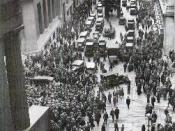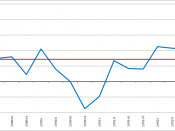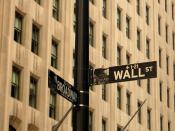Tis' the season to be jolly? With hijackings and anthrax dominating the daily news, it is easy to forget that the holidays are quickly approaching. Lately, the typical American consumer has been staying close to home and watching their spending. Instead of buying expensive suits and jewelry at expensive department stores, people are buying discounted items at Wall-Mart. Instead of going out to a restaurant, or indulging in theater, Americans are sitting at home watching television. Knowing that consumer spending accounts for two-thirds of the GDP, what can we expect? As recently as September, Wall Street experts were keeping their faith that the U.S. could avoid a recession. Industries that usually collapse first such as homebuilders were standing strong thanks to six Fed rate cuts that boosted demand.
Along came September 11th to shake things up even more. The economy plummeted into a full recession, and corporate profits are dropping.
Business Week's flash - profits survey of 124 bellwether companies showed a 54% decrease in third - quarter profits. This is the sharpest quarterly decline Business Week has recorded in more than 25 years. Wall Street forecasters see fourth - quarter profits dropping another 20% and it may take until the third quarter of next year for the economy to recover and profits start increasing again.
The transformation into an always on-war economy will make the recession more severe and will drag economic growth for years to come. The impact of an ever-present terrorist threat differs from a typical war or natural disaster that often ends abruptly and rapidly returns to normal. Unlike past recessions and past wars, September 11th has added an incredible amount of costs and other financial burdens.
The decrease in consumer spending has also put a damper on sales growth. Revenues are expected to be...


